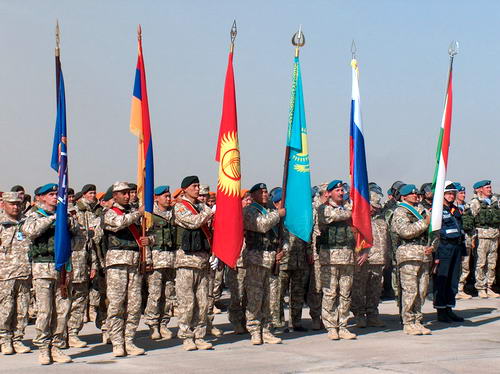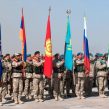
Withdrawal of Uzbekistan from CSTO Facilitates Kazakhstan’s Chairmanship
Publication: Eurasia Daily Monitor Volume: 9 Issue: 131
By:

Bolat Baikadamov, director of the Nur Otan Parliamentary Institute, worries that “Uzbekistan’s withdrawal from the Collective Security Treaty Organization [CSTO] […] weakens both the organization and the very situation of security in the region” (Vestnik Kavkaza, July 9). But Uzbekistan’s move does not present a fundamental challenge to Kazakhstan’s current one-year chairmanship of that organization. Indeed, Tashkent’s withdrawal should make it easier for Astana to realize its vision for strengthening the coherence and powers of the CSTO, which Uzbekistan had generally resisted.
Kazakhstan is one of the most important non-Russian contributors to CSTO structures and activities. Both its 2007 and 2011 military doctrines stress the organization’s value in promoting Central Asian security. For several years, Kazakhstani officers have been attending military academies in Belarus, Russia and other CSTO members (CaspioNet, July 10). This May, Kazakhstan’s First Deputy Defense Minister, Colonel General Saken Zhassuzakov, was appointed head of the CSTO Joint Headquarters (Tengri News, May 22).
Kazakhstan initiated the formation of the CSTO’s new Collective Rapid Reaction Force (Kollektivnye Sil Operativnogo Reagirovaniya – KSOR) in 2009, despite Uzbekistan’s opposition (see EDM, April 10). Kazakhstan has assigned some of its best forces to support the 20,000-strong KSOR, including its 3,500-personnel KSOR peacekeeping unit, as well as the CSTO’s preexisting 4,500-man Collective Rapid Deployment Forces (Kollektivnyye Sily Bistrogo Razvertyvaniya – KSBR). In March 2012, President Nursultan Nazarbayev signed status-of-forces legislation permitting these CSTO multinational military units to deploy temporarily on Kazakhstani territory (Trend, March 15).
In September 2011, Kazakhstani forces played a major role in the Center-2011 exercises (Moskovsky Komsomolts, September 26, 2011). This September, Kazakhstan will host the first exercise of the CSTO’s new peacekeeping forces (PanARMENIAN.Net, May 21). Kazakhstan is also helping prepare for the next major KSBR exercise, Interoperation-2012, scheduled for September 3-8 in Armenia (Kazakhstan’s Ministry of Defense, May 3). Zhassuzakov will serve as one of the exercise commanders (Nezavisimaya Gazeta, May 16).
At an April 6 press conference, Foreign Minister Yerzhan Kazykhanov confirmed that Kazakhstan would adhere to the agenda for its 2012 chairmanship that Nazarbayev presented at last December’s CSTO meeting in Moscow (Trend, April 6). These include pursuing measures to protect the CSTO’s cyber space (informatsionnoye prostranstvo), strengthen the KSBR, enhance Central Asia’s air defenses, counter narcotics, and develop the “Skal’niy gorod – Astana” training site for CSTO members’ emergency ministries. Uzbekistan’s withdrawal does not challenge this agenda. Kazykhanov added that Kazakhstan is generally satisfied with the members’ progress in developing the CSTO’s capabilities under its chairmanship (Kazakhstan’s Ministry of Foreign Affairs, April 6). CSTO chief Nikolai Bordyuzha has in turn praised Astana’s “concrete steps” in the sphere of regional air defense and KSBR modernization (Rossiiskaya Gazeta, February 21).
In an interview with the main CSTO journal, Soyuzniki ODKB (“ODKB Allies” https://gosmedia.nichost.ru/wp-content/uploads/2012/01/Alliance_3-2011.pdf), Nazarbayev said that Kazakhstan would focus on developing the CSTO’s capabilities within its core geographical zone of responsibility (Today.kz, December 20, 2011). However, Astana has also backed efforts to deepen the CSTO’s cooperation with the UN and NATO, though Kazakhstani analysts recognize Russian concerns about US military bases in Central Asia (Risk.kz, December 23, 2011). Kazakhstan supported the CSTO decision to require that all member governments formally consent to the establishment of any new foreign bases in CSTO countries (akorda.kz, December 20, 2011).
Observers such as Maxim Kaznachayev of the Kazakhstan Institute of Political Solutions speculate that tensions with Russia and a desire to strengthen ties with the United States were the main reasons for Uzbekistan’s withdrawal decision. By exiting from the CSTO, Uzbekistan no longer needs the approval of the other members to host US military bases or accept surplus US weapons (Moscow Times, June 29).
Uzbekistan’s new freedom of action might make it a more attractive partner for the West even while harming its relations with Russia, but Kazakhstan has sought balanced relations with all the major powers active in Central Asia. Like Uzbekistan, Kazakhstan has insisted on its right to engage with NATO and other non-Moscow-led structures as part of its multi-vector foreign policies. Kazakhstan and the other Central Asian states continue to participate in NATO and US-led military exercises and support NATO’s Northern Distribution Network (NDN).
Kazakhstani diplomacy genuinely supports many, perhaps even most, Russian security initiatives due to the two countries’ shared interests and perspectives (see EDM, April 10). But Uzbekistan’s defection will remind Moscow of the need to temper its less welcome constraints on Kazakhstan’s freedom of action.




